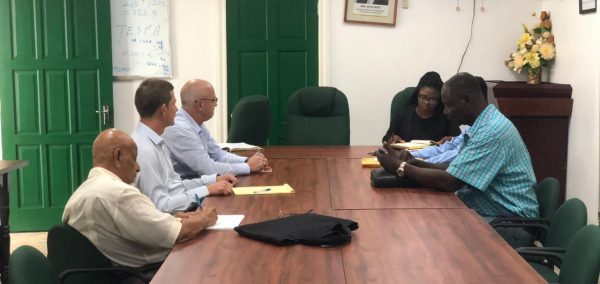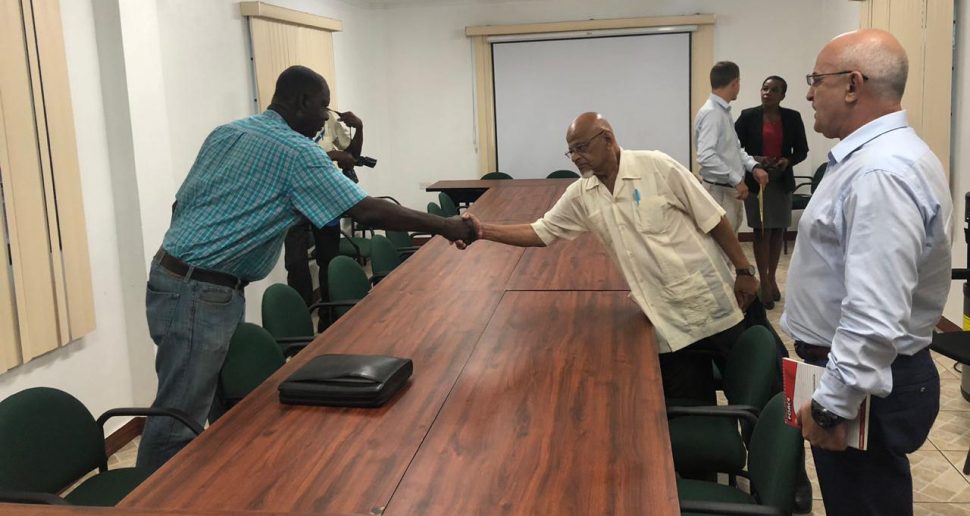After 26 days of industrial action by workers, the Bauxite Company of Guyana Inc. (BCGI) yesterday finally met with the Guyana Bauxite and General Workers Union (GB&GWU) at a conciliation meeting and the two sides have agreed to a bilateral engagement to resolve their current dispute.
This was revealed by head of the GB&GWU Lincoln Lewis yesterday morning at the Department of Labour on Brickdam, in Georgetown, where the meeting took place. Despite the breakthrough after an almost month-long impasse between the two sides, it was made clear that the strike by workers remains ongoing, including the obstruction of the Berbice River.
The RUSAL-owned company had been refusing to recognise the union as the workers’ bargaining agent and RUSAL representative Vladimir Permyakov and BCGI Personnel Officer Mikhail Krupenin had even refused to meet with Lewis and the Union after the strike started on February 15th.

The meeting yesterday commenced just after 10 am and began with a handshake and cordial greetings between Lewis and Permyakov and the company’s representatives, which included labour advisor Mohamed Akeel, who is a former Chief Labour Officer.
Also present at the meeting was Chief Labour Officer Charles Ogle and other representatives from the Department of Labour.
The meeting lasted approximately an hour and afterward Lewis addressed the media and Permyakov, who related that he did not want to say anything and that the union would be making the statement, stood at the side.
“The parties have decided this morning that we need to meet bilaterally starting on Friday morning. The union shall submit to the company by tomorrow our list to form part of the discussion and the company will submit to the union what it considers to be important for the discussion. We believe that this exercise is going to be one where we start building of trust and confidence in a relationship because it is necessary that both sides – the union and the company – work together,” Lewis said.
He explained that in relation to the issue of the company not recognising the union, the BCGI has made it clear that the GB&GWU is the recognised union that it has to work with for its own interest and the interest of the workers and the country.
He said he will be consulting his members on their proposals.
“All we are doing now is to go talk about normalcy, how we are going to get back to normalcy… They are open to dialogue and we have not discussed the issues one by one. We will supply the list by tomorrow and we need to discuss but in the meantime the strike continues,” Lewis explained, while noting that the Department of Labour will be briefed on every development between the two sides.
“I want to commend the guys who were on the ground… These guys, what happened here was made possible by those workers, led by those guys. Not one morning they have called me and complained. They call me to update me on what they will be doing. This is one issue, one struggle that my blood pressure has been normal throughout. There’s no pressure from them and what this is an indication of is the quality of men and women we have on the ground and can be seen as a rebirth of the militancy of the trade unions,” he added.
After the company refused to attend the first meeting facilitated by the Labour Department with the union on February 18th, it fired 61 workers, saying that clauses in their contract stipulate that they couldn’t strike. One worker was subsequently rehired.
Despite subsequent meetings between the government and company, no middle ground was found and the industrial action by the workers was intensified. Eventually, the workers opted to block the Berbice River, preventing BCGI’s barges from entering or exiting.
Thirty more workers were subsequently fired as the company was forced to close down parts of its operation.
Lewis has previously stated several times that they would only be bargaining with the company if it is prepared to reinstate the workers.
The union had also related that it will be asking for better working conditions and salary increases after the unilateral imposition of a 1% increase in wages by the company sparked the strike.










